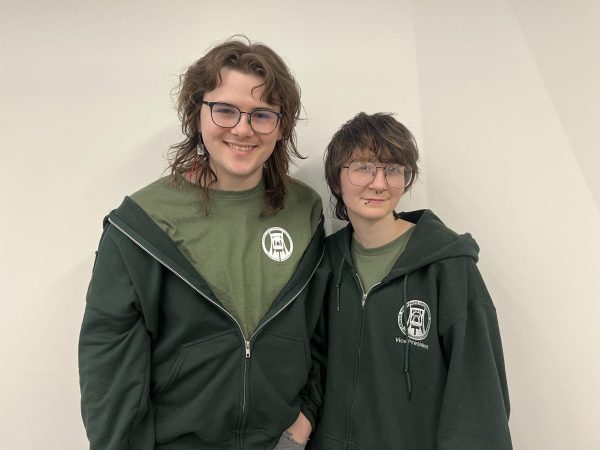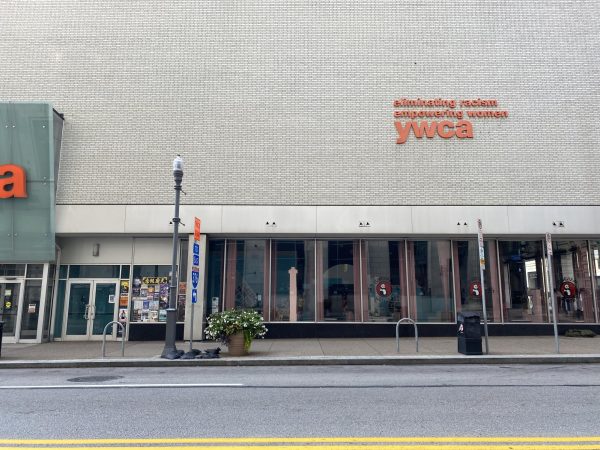Presidential hopeful Bernie Sanders shares platform at rally with Pittsburghers, students

photo by Julianne Griffith
Senator Bernie Sanders (I-Vt.), a democratic candidate for president, speaks to a crowd of 8,500 during the “A Future We Can Believe In” rally at the David L. Lawrence Convention Center on Thursday, March 31, 2016.
Democratic presidential candidate and Vermont Sen. Bernie Sanders brought his populist message to Pittsburgh during a rally at the David L. Lawrence Convention Center Thursday, March 31. Sanders, whose campaign against former Sec. of State Hillary Clinton has been an uphill battle, emphasized trade policy and the differences between himself and his opponent.
“Let me begin by introducing myself to the people of Pennsylvania because I think a lot of folks don’t know who Bernie Sanders is,” Sanders said.
Sanders went on to give background on his life, the campaign that has grown in the past several months and the issues with which his campaign most concerns itself. According to the most recent poll conducted by Franklin and Marshall, Clinton has a 25 point lead over Sanders. In his remarks, Sanders honed in on his ‘three crises’ in America: campaign finance laws, a ‘rigged’ economy and income inequality.
The doors opened to the public at 7:30 a.m., and Sanders was set to speak at 10:30 a.m., but by 5:45 a.m., the line outside the convention center had stretched into the convention center garage. The crowd at the rally primarily consisted of the white, college-aged students who predominantly make up his follower base.
Several Point Park students, including freshman education major and Sanders supporter Alec Ebeling, attended the rally to hear in person what Sanders had to say.
“As a college student, I’m definitely in favor of the free tuition. That’s something that he’s pushed pretty heavily,” Ebeling said at the Thursday rally. “My major concern would be in the college sector with free education and everything … [Additionally,] I think there is some reform that needs to be established, in public schools especially. I don’t think the Common Core is working too well, so I’d like to see what he does in the public schools as well.”
While Sanders didn’t speak to his views on the Common Core specifically, he did mention his proposal to make all public postsecondary schools tuition free.
Kristopher Chandler, a freshman political science and screenwriting double major, is a supporter of former Sec. Clinton and attended the Sanders rally to understand his platform and get a feel for his campaign. Chandler said that while Sanders was able to energize the crowd, his main criticism was that Sanders’ speech was a “laundry list of ideas” rather than solidified solutions to major issues impacting voters.
“The biggest thing for me is what issues influence you the most, how it’s going to personally affect your life,” Chandler said in a phone interview Monday. “For me, at the Sanders rally, it was about his ‘free tuition,’ and I’d like to hear more details about how these candidates can execute these plans. Any candidate can go on stage and talk all day about what they’re going to do, but it’s important for people to hear specific details about how they get it done.”
In an attempt to offer a solution to both income inequality and student debt, Sanders said he would propose a tax on Wall Street speculation to pay for the free tuition program. With nearly every talking point, Sanders brought the discussion back to working on fixing the “rigged economy.”
Sanders said he differs from Clinton on three main fronts: the fundraising efforts, their relationship with Wall Street and their records on trade policies. Sanders attacked Clinton for having a campaign funded by large donors through political action committees, or Super PACs. In an ongoing call for economic transparency, Sanders called upon Clinton to release the transcripts of speeches made to Goldman Sachs.
The primary topic of discussion in a press conference prior to the event was union and trade policies. Sanders condemned the North American Free Trade Agreement (NAFTA) and Trans-Pacific Partnership as policies detrimental to union workers.
Sanders was introduced to the press by Michael Smith of the United Steelworkers Union, Scott Slawson of UE Local 506 in Erie and Ryan Gaines of the United Steel Workers International. Smith spoke about how harmful free trade agreements have been to steelworkers, Slawson spoke on how NAFTA in particular impacted locomotive manufacturer GE in Erie and Gaines talked about the impact of free trade and the war on drugs on the minority community.
“We have got to lift up the standard of living of workers in this country and throughout the world,” Sanders said prior to the rally. “Trade is a good thing, but it has got to be based on fair principles, not unfair regulations.”
Given that one of his examples of positive union industry, the Clairton Coke Works, is charged as being one of the largest polluters in the region, Sanders was asked how his stance on strengthening manufacturing can coexist with his view on helping reverse climate change. Sanders gave a curt answer, pushing the responsibility to the private sector.
“I think you can do both,” Sanders said. “Corporations are going to have to invest in making sure that our kids do not breathe polluted air. We can do that, but we do not have to destroy the manufacturing sector of this country to do that.”
Sanders did not elaborate.
Maddie Whitehill, an organizer with the group “Burghers for Bernie,” said that over 5,000 people had registered to attend the event prior to the event. Mac Lotze, head of press volunteers for the Sanders rally, said 8,500 people attended the event.
Burghers for Bernie, as well as several students online, reported that the event had reached capacity. As a result, several people had to be turned away by Secret Service.
Sophomore funeral sciences major Patrick Fischer, a Sanders supporter whose family is primarily Republican, made it into the rally and said that hearing Sanders in person solidified his support for the presidential hopeful.
“[Seeing Sanders] has changed how I feel about him,” Fischer said. “Because there’s a huge difference from watching him on TV than being there and actually drawing the attention from the crowd and feeling the emotion of what he’s trying to say. You don’t get that when he’s on TV.”
Sanders was the first presidential candidate this season to travel to Pittsburgh, and his opponent former Sec. of State Hillary Clinton will be the second. Clinton will speak at an organizing event at Carnegie Mellon University at 6 p.m. on Wednesday, April 6. The Pennsylvania primary election takes place April 26.
Iain Oldman contributed additional reporting for this piece.




